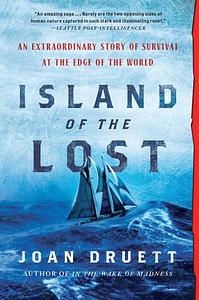Take a photo of a barcode or cover
5 stars for the real life story, but I just didn't care much for Druett's writing. I found it pretty dry, and she follows enough rabbit trails (did we really need to know all the intricacies of seal mating habits??) to the point it started to feel like filler.
That aside, Musgrave's group was insanely impressive. Turns out it's a lot easier to survive as a castaway when one of you is actually the Professor from Gilligan's Island.
That aside, Musgrave's group was insanely impressive. Turns out it's a lot easier to survive as a castaway when one of you is actually the Professor from Gilligan's Island.
Centered on two, separate parties both shipwrecked in the Aucklands at the same time. Much of it is about them clubbing seals to survive but there’s enough detail on their survival and planned escape innovations to make it interesting
This is a fascinating nonfiction book about two different groups of shipwrecked sailors in 1965. Auckland Island is far south in between New Zealand and Antarctica. It is a harsh place and when two different shipwrecks happened within a few months of each other, neither group of survivors was aware that there were people on the other side of the island.
What's so fascinating is that the two groups were so drastically different. The five men on the Grafton worked together and helped each other. Thanks to the resourcefulness of the leaders they managed to survive for nearly two years. The nineteen survivors of the wreck of the Invercauld had a markedly different outcome. They disagreed, split into smaller groups, and did not fare well. Only three survived.
The audio edition narrated by David Colacci is very good. This is the first time I’ve listened to him and would not hesitate to pick up another audio narrated by him.
I did pick up the print edition from the library while I was listening because I wanted to see the map in it for reference.
What's so fascinating is that the two groups were so drastically different. The five men on the Grafton worked together and helped each other. Thanks to the resourcefulness of the leaders they managed to survive for nearly two years. The nineteen survivors of the wreck of the Invercauld had a markedly different outcome. They disagreed, split into smaller groups, and did not fare well. Only three survived.
The audio edition narrated by David Colacci is very good. This is the first time I’ve listened to him and would not hesitate to pick up another audio narrated by him.
I did pick up the print edition from the library while I was listening because I wanted to see the map in it for reference.
This book is very interesting. It almost reads like fiction. The ingenuity of the survivors is the most impressive part. Things like making lime for mortar by burning seashells and making a working forge are really interesting accomplishments. The source material is primarily the published accounts of the two leading survivors (business partners who were captain and first mate on the voyage). As the author acknowledges in an appendix, these accounts are contradictory in some points, so the author mostly just picks one view as the "truth" and tells it without reference to the other in order to maintain the story line of the narrative.
I could have done without the story of the tragic failure of the other contemporary shipwreck survivors on another part of the island. There is a map of the islands, but some higher-resolution maps of areas described and maybe some plates or diagrams of some of the specific vistas, flora, and fauna would have really enriched the book.
I could have done without the story of the tragic failure of the other contemporary shipwreck survivors on another part of the island. There is a map of the islands, but some higher-resolution maps of areas described and maybe some plates or diagrams of some of the specific vistas, flora, and fauna would have really enriched the book.
adventurous
reflective
fast-paced
Read for school but actually pretty interesting I liked it enough
informative
slow-paced
I'm sure I was more interested by this because I come from New Zealand. I was happy to see a cast of native birds and aquatic mammals that are familiar.. and I kept a map open so I could peruse the terrain of the book. These islands are much bigger than I had thought.
The narrator had a good go at the reo Māori, and got most of it about right.. though words like "Ngāti" had him a bit at a loss (hint: not n'Gaat-ee ; soft ng sound like in sing)
I do like a good survival story and was surprised that this book contained more than one. Comparing the strategies and attitudes of two sets of castaways enriched my understanding of what it was like for them. I enjoyed the accounts of how shelter and housing was accomplished, and I'm not too squeamish about having to hunt to survive. I loved looking up the edible plants as I went. Some of the things that were in the reports and memoirs of the lost, were a little fanciful, but why not.
This was a really good counterpoint to that awful whale book 😉 because it actually contained an account of what it is like to be stranded far from family and actually worry about them. I wonder, if the author deliberately omitted the likely Racism and Sexism from the accounts that she selected to present the story of these shipwrecked men. If so, I noticed the absence.
The narrator had a good go at the reo Māori, and got most of it about right.. though words like "Ngāti" had him a bit at a loss (hint: not n'Gaat-ee ; soft ng sound like in sing)
I do like a good survival story and was surprised that this book contained more than one. Comparing the strategies and attitudes of two sets of castaways enriched my understanding of what it was like for them. I enjoyed the accounts of how shelter and housing was accomplished, and I'm not too squeamish about having to hunt to survive. I loved looking up the edible plants as I went. Some of the things that were in the reports and memoirs of the lost, were a little fanciful, but why not.
This was a really good counterpoint to that awful whale book 😉 because it actually contained an account of what it is like to be stranded far from family and actually worry about them. I wonder, if the author deliberately omitted the likely Racism and Sexism from the accounts that she selected to present the story of these shipwrecked men. If so, I noticed the absence.
Graphic: Animal cruelty, Animal death, Death, Gore, Mental illness, Terminal illness, Blood, Cannibalism, Classism
Moderate: Alcoholism, Colonisation
This was very long and detailed. However it was very interesting on how 2 different groups on the island fared sooooo very differently.
I thought it was interesting and the sailors unbelievably resourceful!! They really worked together!
A strangely procedural wilderness story but without the interesting side-stories and themes that I love in someone like Krakauer's work or the mystery of Dead Mountain, which I read last year. This was just ho-hum for such a unique tale.
Joan Druett hit upon a gold mine of material for her book "Island of the Lost: Shipwrecked at the Edge of the World." Two different boats shipwrecked on tiny, inhospitable Auckland Island, miles off the coast of New Zealand. Completely unknown to each other, the two crews really illustrate the difference between men who are driven to survive and men who have given up. One crew worked together (and admittedly had a gun that made a big difference for its food supply) while the other crew fell apart, with most dying, unable to even try helping themselves. The facts of these true tales are really interesting, though I wasn't a huge fan of Druett's storytelling -- especially in the first half of the book... she includes lots of details about the island flora and fauna but the manner of the telling kind of pulled away from the story. I liked the second half of the book better as the story really started to come together.




